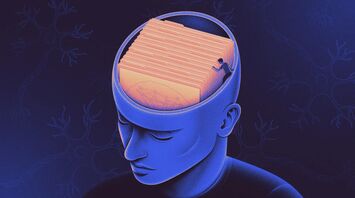Why We Forget New Things and How it Aids Learning

Many of us have experienced walking into a room and forgetting why we went there or starting to speak but suddenly blanking on what we intended to say. The brain, managing numerous inputs and actions, sometimes appears to falter. But what exactly happens when we suddenly forget recent thoughts? This is prepared by SSP.
Memory Mechanics and Types
To comprehend why forgetting happens, we need to grasp how memory functions and recognize the differences between long-term and working memory. Susanne Jaeggi, a psychology professor at Northeastern University, highlights that memory comprises various components linked to different cognitive processes. Long-term memories store knowledge, experiences, and skills for extensive periods, whereas working memory retains thoughts for only seconds or minutes.
Earl K. Miller, a neuroscience professor at MIT, describes working memory as the "sketchpad of conscious thought." It processes every new piece of information, inner dialogue, and sensory input. Often, the fleeting nature and limited capacity of working memory, which may hold only about four to seven chunks of information, lead to thoughts being lost.
Constraints on Working Memory
Miller explains that the brain periodically deletes unimportant items from working memory to welcome new information. Consequently, short-term memories must transfer to long-term storage (a process called consolidation) or they vanish from conscious thought. Since the brain can't genuinely multitask, it juggles ideas, increasing the effort required to manage them and often leading to forgotten thoughts.
For instance, sleep deprivation or the influence of substances like alcohol, or general aging, can decrease the brain's efficiency in managing information.
Adaptive Forgetting as Part of Learning
Contrary to perceiving forgetfulness solely as an inconvenience, emerging research suggests it serves an adaptive purpose. Livia Autore, a neuroscientist at Trinity College Dublin, asserts that forgetting aids memory updating, an essential fitness to navigate ever-changing environments.
Autore's study in "Cell Reports" uncovered that forgetting outlines active neural processes crucial for memory functionality. The research involved an experiment where mice interacted with objects in distinctly walled chambers. When shifting between different object-wall contexts, interference impacted their memory, demonstrating memory suppression induced by contextual changes. This suppression wasn't due to memory loss but a shift to a dormant state.
Jacob Berry from the University of Alberta supports these findings, suggesting suppressed or "demoted" memories still linger and can later be reactivated. Such insights foreground the potential of exploring dormant memories, aiding our understanding of various forgetfulness-related disorders.
Practical Advice to Curb Forgetfulness
To manage everyday forgetfulness, Miller advises against multitasking due to the brain's limited capacity. Jaeggi recommends re-contextualizing situations, such as revisiting a room or retracing one's thoughts, which provides cues for the brain to recover lost thoughts, boosting efficient memory retrieval.
Thus, understanding how our memory works, acknowledging its limitations, and leveraging adaptive forgetting can not only improve our day-to-day recall but also contribute to effective learning processes amidst varied life dynamics.



















